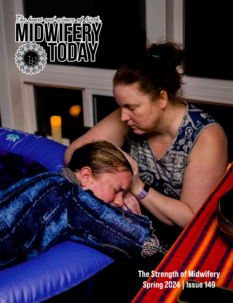
A Note To Fathers: It’s You She Wants
Subscribe to Midwifery Today Magazine
They are nineteen years old and in labor with their first child. Three months earlier they sat in my living room, asking questions and scribbling notes during childbirth classes. In many ways, they seemed to still be children themselves.
But not today. Today they are in labor. As each contraction begins to build, her small body loosens and lets go, her eyes close in concentration, her cheeks flush with effort. I sit and watch as he holds her, tears streaming down his face. Her pain is his pain. They are one in the process of birth.
Between contractions he wipes her face with a cool cloth, gently patting each eye with a tenderness that is like worship. As their labor unfolds I know that I am witnessing more than the birth of a baby. It is also the birth of a woman and a mother; the birth of a man and a father; the birth of a relationship that will never, ever be the same.
What is the role of the father who is present at the birth of his child? Is he a labor coach, advocate or partner? Is he a fifth wheel? A nuisance? A liability? In the twelve years that I have served birthing families in my community, I have heard many passionate opinions about the presence of fathers at birth. Over the years my own understanding of the role that fathers play in pregnancy and birth has developed to become much deeper and more complex as I have served different families, each with their own unique relationship, culture, expectations and beliefs.
In the early days of my work as a childbirth educator and doula, I saw fathers as “labor coaches” who had a unique place in the “birth team.” Many of my couples gave birth in hospitals, so I prepared the fathers in my classes to assist their partners in two ways. First, as a labor assistant helping the mom achieve deep relaxation, working with her body and performing comfort measures such as massage. Some fathers loved doing these things. Others found them to be awkward and even embarrassing. With gentle guidance and encouragement, each father eventually found his own way of participating in his baby’s birth. But one thing was certain: each father was as unique as each laboring woman, and no predetermined agenda of mine was going to result in a cookie-cutter army of labor coaches able to do the job in the same way at each birth!
The second task I undertook was training fathers to be advocates for their partners in relationship to the hospital staff. This was accomplished by thoroughly explaining medical procedures, informing them of their rights, and reminding them continually that it was their baby, their birth, and their choice. Some dads really got off on this! The idea of storming the hospital and fighting for what they wanted was FUN. Often I felt as though I’d created a monster. I worked hard to teach tact, diplomacy and the fine art of negotiation. Other dads were absolutely terrified by the thought of doing battle with medical professionals. No matter how well prepared they were with information, no matter how empowered they were with choices, no matter how deeply they believed in their partner’s ability to give birth, they invariably ended up paralyzed and mute in the face of unwanted intervention—like deer caught in the headlights.
Once again it became clear that each situation, each couple, each birth presented unique challenges that simply could not be addressed in a predetermined, formulaic way. My approach to fathers at birth, I finally realized, would have to be like my approach to mothers at birth: guided by observation and intuition, deep caring, respect and a firm belief that if both he and his partner wanted him to be present and involved, then there was a unique niche for him and together we would find it.
Gone, now, were the labels and expectations. Instead, we looked for each father’s unique strengths and liabilities. Most of all, I assured each dad that he never had to be anyone or anything other than himself at the birth. I also told my dads that they were their partner’s lover and that their most important role at the birth was one they did every day without classes, books, or practice: loving the mom. You could literally see the dads relax as this thought sunk in and took root. Just be yourself. Just love your partner. It’s you she wants at the birth, not someone else’s idea of a labor coach. You.
And the result of all this was beautiful to behold: couple after couple finding the way to labor together in a dance that was uniquely their own.
Related information:
- A Father’s Point Of View – by Anthony Wilson
- Caught Off Guard: One Father’s Memories – by Steve Hinnefeld
- More articles by Michel Odent
- Midwifery Today Issue 8 (Fathers)
- Midwifery Today, Issue 51 (Fathers in Pregnancy and Birth)

 Lois Wilson has been serving women and families as a midwife, teacher, activist, and advocate since 1986. She believes that birth is a sacred and natural event and that all birthing families deserve the very best support. She also believes that we should choose our teachers and mentors wisely because we will become like them. Lois is the founder and director of True Heart Birthing, a mentoring program for new and aspiring midwives, doulas, and birthworkers that is set apart by our deep faith in natural and undisturbed birthing and our belief that a hands-on, mentoring approach to learning the art, heart, and skills essential to your practice is far superior to institutional and online learning. Lois is committed to keeping the true heart of birthing alive and thriving, and passing it on to the next generation.
Lois Wilson has been serving women and families as a midwife, teacher, activist, and advocate since 1986. She believes that birth is a sacred and natural event and that all birthing families deserve the very best support. She also believes that we should choose our teachers and mentors wisely because we will become like them. Lois is the founder and director of True Heart Birthing, a mentoring program for new and aspiring midwives, doulas, and birthworkers that is set apart by our deep faith in natural and undisturbed birthing and our belief that a hands-on, mentoring approach to learning the art, heart, and skills essential to your practice is far superior to institutional and online learning. Lois is committed to keeping the true heart of birthing alive and thriving, and passing it on to the next generation.
















